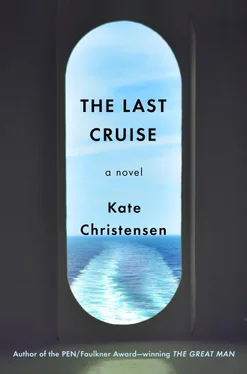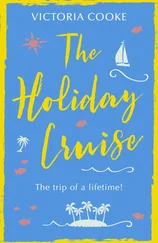“Very dangerous,” said Ivan. “Hundreds of people, in the open ocean?”
“Not to mention expensive,” said Eduardo. “That’s the main thing, I’m sorry to say. In emergencies, they charge you ten times as much because they can get away with it. And the lawsuits if there were any accidents… which is highly possible, in fact it would be unusual if there weren’t some accidents, given how many people we are and how perilous the maneuver would be. It’s a different matter if there are only ten or twenty trained crew on a stranded ship and another one nearby, that’s worth the odds. But Cabaret can’t risk it for us, for all these reasons. We’re much better off floating here until the tugs can come get us and tow us home.”
“But what if a storm comes?” Miriam said. “What if we capsize?”
Ivan and Eduardo exchanged another look.
“That’s why we have lifeboats,” Kimmi said with bright assuredness. “But don’t worry, we won’t need them. The tugboats will come soon. For sure.”
Miriam looked back at Eduardo. “When are they supposed to get here?”
“A day or more,” said Eduardo.
“How long will it take them to tow us into port once they finally get here?”
“A while,” said Eduardo. “Maybe five, six days.”
“There is an airdrop of supplies coming today,” said Kimmi. “On the plus side. Food and water and maybe engine parts, I don’t know for sure.”
“That is good news,” Miriam said, hoping, for Sasha’s sake, that the parts would come. “Is there anything I can do to help?”
“We’re okay here,” said Kimmi. “But you could try the infirmary.”
“I will,” said Miriam.
She left the three of them on the bridge, staring out together at the barren wasteland of water, and made her way down to the promenade deck. In the infirmary, she found the ship’s medic, Mike Pruitt, whose brushy light-brown hair and wire-rimmed glasses made him look more like a pastor or a tax accountant than a doctor.
“How are things down here?” she asked him.
“Pretty bad,” he said. His glasses were slightly fogged. He looked harried and out of his depth and apologetic. “And with norovirus, there’s not much you can do for it, medically. Time, hydration, rest. Keep it contained. But on this scale, it’s pretty intense. It’s a bad one.”
Miriam looked at all the dozens of deck chairs lined up against the inner wall of the promenade deck, a long row of field cots filled with people who were clearly suffering, some in stoic silence, some vocally. She heard sighs and groans of pain and muttered laments. Several people, pale and agitated, waited by the doors to the two bathrooms with working toilets, the only two on board. She felt nervous, being here, and frankly terrified of catching this awful thing herself.
“Can I do anything to help?” she asked.
“Try Flaminia,” he said. “She might be able to think of something.”
A couple of days ago, when the norovirus epidemic became serious, a retired nurse named Flaminia had come out of the crowd of passengers to offer her services. She was a glamorous seventyish Italian woman who seemed far more confident than Mike Pruitt. She collected asthma inhalers, unused pain medications, antibiotics, and anti-diarrhetics from the crew and passengers, and was now rationing them to the patients who needed them the most.
Miriam found her in the little room off the grand hallway that had been turned into the makeshift dispensary.
“Antibiotics,” said Flaminia, holding up a bottle as Miriam entered. “Look, here, how much is left in this bottle. They took half the course and then they stopped taking them. Very bad practice. Not that these are any use against this virus.”
“I came to see if I could help you. I’m Miriam. I’m with the string quartet.”
Flaminia gazed at her for a moment as if skeptically assessing her potential usefulness. “The restaurant crew brings water, the stewards help with cleaning,” she said. “But maybe…”
“I have no nursing training, but I did raise two children,” Miriam added.
“There is really very little we can do for them,” said Flaminia. She added in a half whisper, “Three people already have died.”
Miriam stared at her, horrorstruck. “People died?”
“Shhh,” said Flaminia, putting a finger to her lips, glancing at the open door. “The crew doesn’t want us to know. They’re afraid of panic. They even tried to hide it from me, but how could they. I saw them, removing the bodies, very early this morning. This is a terrible epidemic. More will die tonight. Nothing we can do about it.”
“Where did they put the bodies?” said Miriam, aghast.
Flaminia gave an expressive, pragmatic Italian shrug. “Maybe overboard, who knows?”
“Oh, how awful.” Miriam braced herself with a hand on the table. “I won’t tell anyone, I promise. But what can I do? What do you need?”
“Play something, maybe. Music. For the patients.” Flaminia ticked her tongue against her front teeth and nodded. “Yes. Some music might be very nice for them. Make them forget they’re sick.”
“I’ll go and get my violin,” said Miriam. “I’ll be right back.”
She hurried out and climbed the stairs back up to the owner’s suite. There she found Isaac and Rivka exactly where she’d left them earlier, sitting side by side on the main balcony, staring in silence at the horizon.
“Isaac,” she said. “Come. I need you. Get your viola. We’re going down to play for the sick people, the nurse asked me.”
He made a face like a fussy baby confronted for the first time with a new food. “Right now, you want to do this?”
“What, you’re too busy? Yes, right now!”
“The two of us? Play what?”
“Anything. One of the five thousand pieces we know. These people are dying, Isaac!” He eyed her, hesitating. “Forget it,” she said.
She turned back into the suite, fetched her violin out of the closet, and went out along the catwalk. When she got to the top of the stairway, she stopped and turned back to see Isaac, lumbering toward her, shading his face with his hand to block the sunlight, carrying his bulky viola case. In that moment she felt that in all the years they’d been together she had never been happier to see him.
*
As soon as Christine left the galley with her friend, Mick’s mood dropped. He felt sluggish, depressed, on the verge of unleashing his pent-up anger. They should have been in Honolulu days ago. He’d been eligible for shore leave on this cruise. But instead he was stuck in this dark, airless, infernally hot kitchen while food supplies steadily dwindled. He didn’t know where else to go.
Kenji had been hit by the norovirus two days before, and had joined all the other quarantined sick people writhing in deck beds on the promenade. So Mick was in charge. But there was so little left for anyone to do that the crew had started spending most of their time up on the main deck with the walkouts, doing nothing, waiting. Christine was the only one who came down to the galley regularly. And now that she was gone…
The dark galley air felt thick with a residual static-electric energy, reverberated with all the furious work that had gone on down here before the engines died. So many people, so much heat. It made him weirdly nostalgic. He almost wanted to crawl into a supply closet and hide there, like a little kid, hoping that if he squeezed his eyes shut and counted to three, it would all be the same again when he came out, the galley full of people, food, action, with bright lights gleaming on stainless steel, the air roaring with the vents and air-conditioning, the stoves flaming with heat.
He remembered the captain’s table dinner, when he had given that impromptu speech about Chef Viktor, how Laurens had reacted, the withering scorn. Save your private memoirs for old age.
Читать дальше












